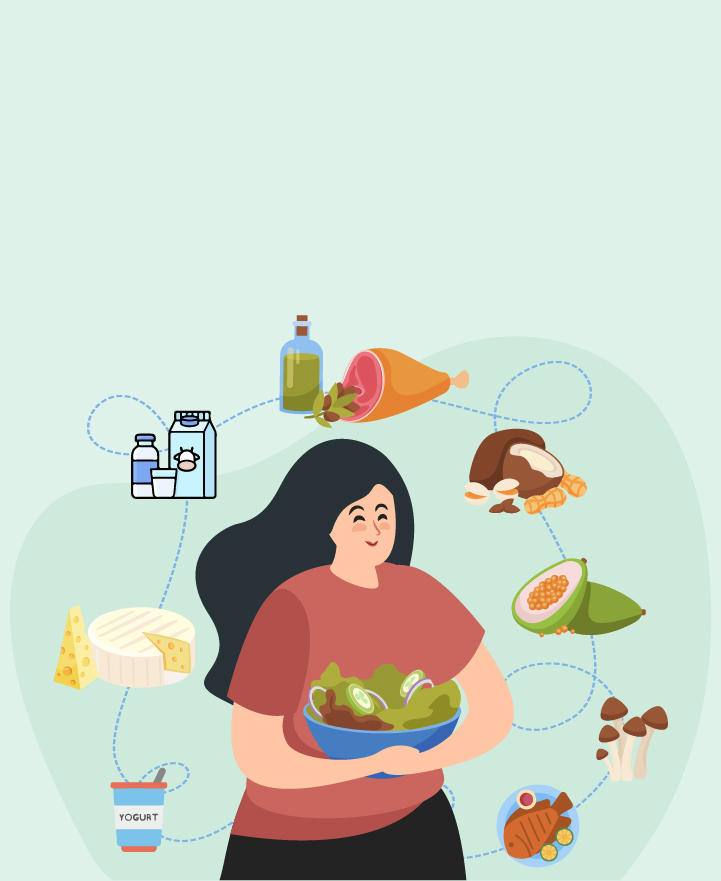

The Keto Diet: Everything You Need to Know
There are many popular diets in the world today but among them, most widely followed one is the Keto diet. But exactly what is keto? Is the Keto diet really helpful? Can everyone follow it? Read on to get answers to all your questions, and then decide if Keto is the ideal diet for you.
What is Keto?
‘Ketogenic’ is a term for low carb diet where the idea is to get more calories from proteins and fat and less from carbohydrates. You cut back most on the carbs that are easy to digest as they contain natural sugar, like sugar, soda, pastries, and white bread. The ketogenic diet’s increasing popularity is largely due to its potential benefits for weight loss and blood sugar control.
Foods to Eat on Keto Diet:
Here are foods that one can eat on the keto diet.
● Seafood – fish and shellfish
● Meat& poultry
● Eggs
● Cheese such as blue cheese, cream cheese, feta, goat cheese, cheddar etc
● Plain Greek yogurt
● Cottage cheese
● Green leafy vegetables such as lettuce, spinach, cabbage, kale, mustard greens, etc
● Healthy fats such as butter, ghee, extra virgin olive oil
● Unsweetened plant-based milk including soy, almond, and coconut milk
● Nuts and seeds including almonds, pecans, walnuts, chia seeds, flax seeds
● Dark chocolate and cocoa powder
● Unsweetened coffee and tea
Foods to Avoid on Keto Diet:
There are some foods that need to be avoided if you want to be on successful keto diet. They are:
● Bread, pasta, rice, and other refined carbs
● Beer and mixed drinks
● Honey and syrups
● Juice
● Sugary sodas
● Starchy vegetables such as potato, radish, etc
● All forms of root vegetables
● Certain fresh fruits like mangoes, bananas, and grapes
● Beans and other legumes like beans, lentils, and chickpeas
Benefits of Keto Diet:
The ketogenic diet is far more than a lose-weight-quick diet. There are many health benefits associated with this diet such as:
1. Weight loss
This is probably the most commonly cited health benefit of the ketogenic diet. With keto, weight loss is real and effective as it helps people convert from a carb-heavy diet, carb-burning diet to a fat-heavy, fat-burning diet.
2. Diabetes and blood sugar control
Since you eliminate sugar and most carbohydrates on a keto diet, it’s not hard to understand why it’s great for blood sugar control.
3. Reduced appetite
A major benefit of a keto diet is that it doesn’t bring in those feeling of food crashes and carb cravings.
4. Inflammation
When on a keto diet, body produces ketones which are strong anti-inflammatory chemical, which helps to inhibit the inflammatory pathways.
5. Improves acne
By decreasing carb intake, a ketogenic diet could reduce acne symptoms in some people.
6. Cholesterol
When a person follows a ketogenic diet, there is a significant drop in levels of total cholesterol, LDL and triglycerides, and an increase in levels of good cholesterol. This reducing effect on cholesterol in turn may reduce a person’s risk of heart complications.
Risk and Complications of a Keto Diet
While the ketogenic diet may have a range of health benefits, staying on this diet for a long-term can have an adverse effect such as:
• Kidney stones
• Excess protein in the blood
• Mineral and vitamin deficiencies
• A build-up of fat in the liver
Some people should avoid the keto diet, including:
• People with diabetes who are insulin dependent
• People who have eating disorders
• Those with kidney diseases or pancreatitis
• Women during pregnancy and breastfeeding
Conclusion
A ketogenic diet is a good and effective diet that not only helps you lose weight, but it also has several other health benefits. However, if followed for long-term, it can have adverse effects. People looking to start the keto diet should seek consultation with a doctor or health expert to ensure that the diet is perfectly suited for their body.
Disclaimer: This blog provides general information and discussions about health and related subjects. The information and other content provided in this blog, website or in any linked materials are not intended and should not be considered, or used as a substitute for, medical advice, diagnosis or treatment. Kindly contact your Doctor before starting a new medicine or health regime.
Related Articles
New Diet Trends You Need To Watch Out For In 2022
How To Start A Diet And Sustain It?
Planning To Go On A Diet? Here Are 5 Questions To Ask First
Published on August 24, 2022

















 Health Insurance
Health Insurance  Travel Insurance
Travel Insurance  Car Insurance
Car Insurance  Cyber Insurance
Cyber Insurance  Critical Illness Insurance
Critical Illness Insurance
 Pet Insurance
Pet Insurance
 Bike/Two Wheeler Insurance
Bike/Two Wheeler Insurance  Home Insurance
Home Insurance  Third Party Vehicle Ins.
Third Party Vehicle Ins.  Tractor Insurance
Tractor Insurance  Goods Carrying Vehicle Ins.
Goods Carrying Vehicle Ins.  Passenger Carrying Vehicle Ins.
Passenger Carrying Vehicle Ins.  Compulsory Personal Accident Insurance
Compulsory Personal Accident Insurance  Travel Insurance
Travel Insurance  Rural
Rural